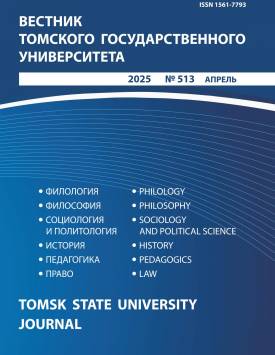Semyon Frank and Karl Rahner: Religious and philosophical critique of secular utopianism and justification of modernity
This study involves the analysis of the problems of secular utopianism and political ideologies of the twentieth century, as well as the future of Christianity in a modern society. The "incompleteness" of the modern project is stated, as well as the specificity of the forms of its "self-understanding" (Julius Habermas). The conflicts taking place in the world today indicate the continuation of the unfolding of the contradictory dynamics of modernity, contrary to the recently popular concepts of the "end of history", embodied in the linear theories of modernization and secularization of the second half of the twentieth century. Modernity is becoming a "pluralistic project" that implies many cultural and historical modifications (Shmuel Eisenstadt). This, among other things, implies further competition between secular ideological projects and traditional religions. Intermediate options are also possible, one of which is the concept of "traditional values", which is relevant in Russia, which implies the construction of a secular modification of modernity based on the values of traditional religions and Christian anthropology. In this regard, this article offers an analysis of the views of the German Catholic theologian Karl Rahner and the Russian religious philosopher Semyon Frank. The focus is on two works - "Marxist Utopia and the Future of Christianity" (1966) by Rahner and "The Heresy of Utopianism" by Frank (1946), in which the authors discuss the role and status of the Christian religion in modern society and the problem of the spread of secular utopias, which, from their point of view, represent a form of distortion of religious goal-setting. Rahner notes that Christianity does not have its own form of "this-worldly utopia"; therefore, Christianity is obliged to resist the dominance of "secular ideology", which does not tolerate competition. Secular utopia itself, in its essence, is a distortion of Christian eschatology, replacing the idea of the absolute future presented in Christianity with "the future created". Rahner defends the idea of ideological and religious pluralism, believing that the openness of the future, characteristic of modernity, also corresponds to the basic Christian idea. Frank notes that utopia is a form of "heresy", that is, a "private" distortion, an exaggeration of Christian ideas about the need to eradicate evil. Utopian ideology assumes the possibility of the essential and final eradication of evil "by earthly means", whereas this is possible only through personal effort through faith. Frank also defends the pluralism and openness of modern society, emphasizing that Christianity in modern society is given the opportunity to openly profess its views without linking its activities with the organization of church authority. The author declares no conflicts of interests.
Keywords
religion, utopia, modernism, secularization, ideologyAuthors
| Name | Organization | |
| Girinskiy Aleksandr A. | HSE University | agirinskiy@gmail.com |
References

Semyon Frank and Karl Rahner: Religious and philosophical critique of secular utopianism and justification of modernity | Vestnik Tomskogo gosudarstvennogo universiteta – Tomsk State University Journal. 2025. № 513. DOI: 10.17223/15617793/513/8
